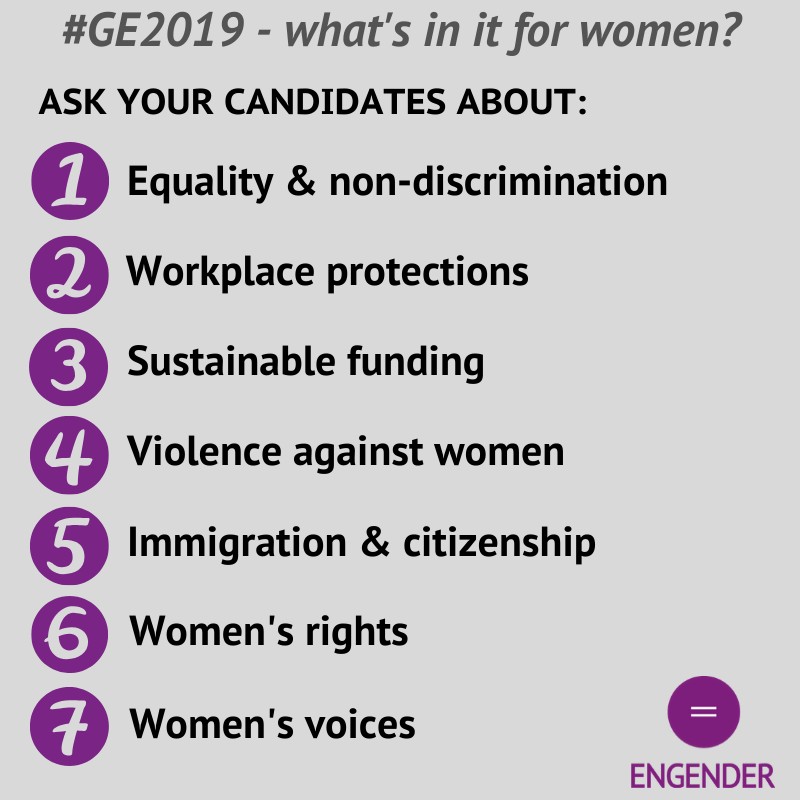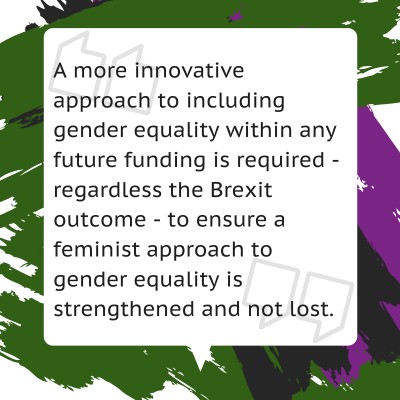Engender blog
CEDAW: how are the UK and Scottish Governments responding to the recommendations?
-400.png)
During the 8th periodic review of the UK from the Committee of the Convention on the Elimination of All Forms of Discrimination Against Women, the UN Bill of Rights for women, several recommendations were made to the UK Government to improve women's equality and rights (find out more about the CEDAW process here).
These recommendations included three specific areas that the UK is meant to feedback their progress on – incorporation of CEDAW, the impacts of Brexit, and an oversight mechanism for women’s participation in CEDAW at UK level. The UK Government has submitted its progress report on these areas, but it didn’t consult with any of the organisations who have been involved with the CEDAW process at UK level (Engender, the Women's Resource Centre, the Northern Ireland Women’s European Platform, and Women’s Equality Network Wales), and it’s fair to say they were wearing their rose-tinted glasses while writing their report.
#GE2019 - what's in it for women?
The snap General Election has seen record numbers of people registering to vote, parties scrambling to select candidate and release manifestos, and wall-to-wall coverage of different Brexit proposals.
As we approach the UK General Election on the 12th of December 2019, Engender is concerned that significant uncertainties with respect to women’s futures remain. Despite the fact that this election has been nicknamed “the Brexit election” we have not heard any proposals or commitments from any party which centre women within their vision for the future. This is highly concerning given that EU-membership has been instrumental in progressing women’s equality in the UK, driving the expansion of gender mainstreaming into UK and Scottish policy, and ensuring minimum legal protections for women’s rights and equality, particularly in the workplace.
So we have identified seven key areas which are vital for women's equality, and which should feature in this election:

GUEST POST: Brexit - a risk to women's equality, or an opportunity to reshape gender mainstreaming in economic development?
In the week which has seen a further Brexit extension, we host a guest blog from Leanne Wilson, PhD Candidate at the WiSE Research Centre for Economic Justice at Glasgow Caledonian University. Leanne is feminist economist researching the effectiveness of gender mainstreaming as a strategy for advancing gender equality, specifically within the European Structural and Investment Funds and economic development policies in Scotland. You can find Leanne over on Twitter @LeanneWilson82

'Gender mainstreaming' has been an integral strategy for gender equality within the European Structural Investment Funds (ESIF) since the 2000-2006 funding period. Therefore, with Brexit looming and the risk of losing the strategy in economic development policies there is an urgency to assess its effectiveness. Gender mainstreaming was endorsed by the 1995 Fourth World Conference on Women and has continued to be the strategy of the EU in many of their policies. The UN define gender mainstreaming as “the (re)organisation, improvement, development and evaluation of policy processes, so that gender equality perspective is incorporated in all policies at all levels and at all stages, by actors normally involved in policy-making”.
It is contested as a strategy as it has been widely debated by feminist researchers for its ability to transform structural inequalities. It is argued that it involves two different structures, ‘gender equality’ and the ‘mainstream’ which are conflicting, and in some instances competing, frames. However, I fear that leaving the EU will derail any success it has had, and therefore I want to highlight any learning from the experience in Scotland which will ultimately inform successor funding. This blog discusses my early research findings and opinion on the success of the Scottish implementation of gender mainstreaming in economic development polices and, therefore, the implications post-Brexit.
Engender joins forces with over 85 civil society organisations to express concerns about no-deal
Today Engender has joined forces with over 85 organisations from across the UK in expressing our shared and serious concerns about the impacts a no-deal Brexit will have on civil society. Collectively, we have called on the Prime Minister to urgently engage with civil society to address the risks that leaving the EU without a deal on the 31st October presents.[1]
Signatories of the letter have serious concerns that a no-deal exit will be a direct threat to the peace process in Northern Ireland, result in regression of rights and standards, uncertainty about the future, and about the lack of adequate engagement and support from the Government.
Stay up to date with Engender's work in Europe
Engender sits on the United Kingdom Joint Committee on Women, which represents the UK at the European Women's Lobby. In June our director Emma Ritch was in Brussels for the European Women's Lobby General Assembly and here, she talks about the importance of our work with our feminist sisters across Europe.
We know that Brexit is on the minds of women in Scotland at the moment. The Conservative leadership campaign that will select the next UK Prime Minister has brought a lot of fears to the surface about immigration, women’s rights, care, and the economy.
Brexit was also on the agenda of the European Women’s Lobby general assembly, which I attended along with colleagues from sister organisations in Wales, Northern Ireland, and England. Together Engender, Northern Ireland Women’s European Platform (NIWEP), Women’s Equality Network Wales, and England’s National Alliance of Women’s Organisations makes up the UK Joint Committee on Women. We are the UK representation to the Lobby, which is the largest umbrella body of feminist organisations in Europe.
Downloads
 Engender Briefing: Pension Credit Entitlement Changes
From 15 May 2019, new changes will be introduced which will require couples where one partner has reached state pension age and one has not (‘mixed age couples’) to claim universal credit (UC) instead of Pension Credit.
Engender Briefing: Pension Credit Entitlement Changes
From 15 May 2019, new changes will be introduced which will require couples where one partner has reached state pension age and one has not (‘mixed age couples’) to claim universal credit (UC) instead of Pension Credit.
 Engender Parliamentary Briefing: Condemnation of Misogyny, Racism, Harassment and Sexism
Engender welcomes this Scottish Parliament Debate on Condemnation of Misogyny, Racism, Harassment and Sexism and the opportunity to raise awareness of the ways in which women in Scotland’s inequality contributes to gender-based violence.
Engender Parliamentary Briefing: Condemnation of Misogyny, Racism, Harassment and Sexism
Engender welcomes this Scottish Parliament Debate on Condemnation of Misogyny, Racism, Harassment and Sexism and the opportunity to raise awareness of the ways in which women in Scotland’s inequality contributes to gender-based violence.
 Gender Matters in Social Security: Individual Payments of Universal Credit
A paper calling on the Scottish Government to automatically split payments of Universal Credit between couples, once this power is devolved to the Scottish Parliament.
Gender Matters in Social Security: Individual Payments of Universal Credit
A paper calling on the Scottish Government to automatically split payments of Universal Credit between couples, once this power is devolved to the Scottish Parliament.
 Gender Matters Manifesto: Twenty for 2016
This manifesto sets out measures that, with political will, can be taken over the next parliamentary term in pursuit of these goals.
Gender Matters Manifesto: Twenty for 2016
This manifesto sets out measures that, with political will, can be taken over the next parliamentary term in pursuit of these goals.
 Scottish NGO Briefing for UN Special Rapporteur on Violence Against Women
Joint briefing paper for the UN Rapporteur on Violence Against Women.
Scottish NGO Briefing for UN Special Rapporteur on Violence Against Women
Joint briefing paper for the UN Rapporteur on Violence Against Women.

Newsletter
Sign up to receive our newsletter here:
Sign up to our mailing list
Receive key feminist updates direct to your inbox: